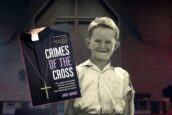
Churches encouraged to hold a minute’s silence in support of child abuse survivors
Adults Surviving Child Abuse (ASCA) and the Alliance for Forgotten Australians (AFA) have called on churches and church communities around Australia to acknowledge survivors of child abuse by holding a special ceremony and a minute’s silence during Forget-Me-Knot Week, November 14-20, 2011.
Saturday November 19 is the third annual Forget-Me-Knot Day, when all Australians are encouraged to unite in support of the more than two million adult survivors of child abuse.
The call is urging church leaders to help survivors reconnect with their communities and further break the silence concerning child abuse within religious environments.
ASCA Head of Stakeholder Relations, Dr Cathy Kezelman, said, “For a large number of Australians, religion permeates many aspects of their lives, including family relationships, friendships and their sense of community.
“We hope churches around the country recognise the weight of the small but powerful gesture of holding a minute’s silence. Such events could go a long way towards supporting those who have been abused (regardless of who has perpetrated the abuse) and breaking down the taboo around the legacy of child abuse.”
Caroline Carroll, Chair, Alliance for Forgotten Australians, reminds church leaders that the Senate Report (2004) on Australians who experienced childhood institutional or out-of-home-care called for forms of acknowledgement and inclusion that go beyond “empty gestures” as ways of overcoming “a complete lack of understanding of or acceptance of responsibility for the level of neglect, abuse and assault that occurred”.
In Australia, one in three girls and one in six boys are sexually abused before the age of 18. Many more experience the impacts of physical and emotional abuse and neglect, as well as the effects of living with domestic violence. Seventy-six per cent of women and 72 per cent of men with severe mental illness have been victims of abuse.
“All too often, the trauma of childhood abuse is swept under the carpet. For most survivors, the recovery process begins when their abuse is acknowledged. Church leaders have a responsibility as community leaders to set an example by providing support to survivors within their midst as they work through and deal with their pain,” said Dr Kezelman.
Participating churches will be recognised on the ASCA website. Visit the Forget Me Knot website to register your service or to find a service near you.
About ASCA
ASCA is a charity which focuses exclusively on advancing the needs of the more than two million Australian adults surviving child abuse. ASCA was formed in 1995 and its current activities encompass a range of trauma specific services: a 1300 information/support line — 1300 657 380 — website, newsletters for survivors and health professionals, workshops for survivors and their supporters, education and training programs for health care professionals and frontline workers, national network of services and practitioners with the experience and expertise to specifically address survivors’ needs.
ASCA is also a founding member of the committee advocating for a national agenda around Trauma informed Care and Practice. ASCA is the key national Australian organization to support adults with complex needs who have experienced all forms of child abuse and neglect i.e. interpersonal trauma in childhood, and receives no ongoing government funding.
Statistics on Australian adults surviving child abuse [i]
A 2007 multi-University Australian study” of over 21 thousand older Australians, the largest of its kind to date found that over 13% reported having been sexually or physically abused in childhood.
These figures did not include those emotionally abused or neglected or forced to live with family violence. In an earlier study from 2005, a personal safety survey conducted by the Australian Bureau of Statistics, 18% of people over 18 reported having experienced physical or sexual abuse before the age of 15.
Emotional abuse, neglect and being forced to live with family violence were excluded yet again. Australia’s current population is around 21.5 million.
[i]Draper, B., Pfaff, J., Pirkis, J., Snowdon, J., Lautenschlager, N., Wilson, I., et al. (2007). Long-Term Effects of Childhood Abuse on the Quality of Life and Health of Older People: Results from the Depression and early prevention of Suicide in General Practice Project. JAGS




























































